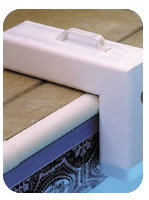THE POOLGUARD IN GROUND POOL ALARM is an electronic monitoring system that automatically sounds an alarm when a child or pet over 5kg, falls into your unsupervised pool. The alarm is equipped with state-of-the-art pool alarm technology – subsurface wave detection. It is feature-rich, simple to operate and has been subjected to rigorous testing before released into the market. Entry into the pool will be detected by the unit’s electronic sensor, thus triggering a loud pulsating alarm on the pool side fitted unit and on a wireless receiver placed within your ho me.
me.
NOTE: Swimming Pool Alarms should be included in any pool owner’s safety program. Alarms for pools are most effective when combined with several other “layers of Protection” for pool safety.
POOL ALARMS DO NOT PREVENT DROWNING AND ARE NO SUBSTITUTE FOR PROPER SUPERVISION AND SAFE SWIMMING PRACTICES.
LAYERS OF PROTECTION
- Supervision is always your primary layer of protection, but as the study shows, 69 percent of the drowning incidents occurred when parental supervision failed and there were not other “backup layers” in use.
- Access doors to the pool area with high locks are a secondary layer of protection.
- Alarms on access doors is another layer of protection.
- A pool safety barrier (fence) separating the pool from your home and all access doors and entrances is one more layer of protection.
- Water survival training for a child when he is capable of crawling or walking to the pool.
- CPR and your knowledge of rescue techniques are a final layer of protection should there be an accident.
- The goal, with instituted layers of protection, is to come as close to a “fail safe” system of preventing drowning incidents as possible. Meaning that if there is a momentary lapse of supervision for whatever reason, we have several backup systems in place. We have “Layers” of protection.
- All must fail before a drowning can take place. A door has been left unlocked or open, the alarm system or device for the door has been turned off, the pool safety barrier has been left open, your child does enter the water, panics and does not attempt to utilize survival swim training, CPR is administered too late to save the child.
THERE CAN BE NO COMPROMISE ON POOL SAFETY. YOU ARE DEALING, LITERALLY, WITH A LIFE AND DEATH SITUATION.
Set down definite pool rules covering its use and more importantly, when it is not in use. We all have a tendency to give a little leeway on this or that with our children, but not when it comes to the pool.
Any door leading to the pool area should be kept locked.
Even if your home is equipped with an alarm system that will beep when perimeter doors are opened, install simple contact alarms on the more often used doors as a further safeguard. Pool Guard makes an excellent alarm designed strictly for access doors to the pool area. This type of alarm must have the button pushed whenever the door is opened and has a delay feature to keep if from sounding off for seven seconds for entering from the inside. It is particularly useful if you have older children who open doors to the pool area. Sliding glass doors should be locked at the top in addition to other locks. In two thirds of the drowning cases studied where children were thought to be in the home, sliding glass doors were either left open or opened by the toddler.
If you own a pool this is a must!
Install a protective safety barrier or pool fence that will eliminate access to the pool for young children and pets.
Floating pool alarm devices with remote alarms sounding in the home can alert you to a child falling into the pool. The pool surface, however, must be disturbed enough by the fall so as to set off the alarm. Since these alarms do work off a disturbance to the surface of the pool; your child could quietly walk down the steps, go under, drown, and never disturb the alarm or set it off!!! They are quite inexpensive (around R1000) and better than nothing at all since they do detect some accidental falls if adjusted and placed properly. Alarm batteries and function should be checked often to increase the safety margin and effectiveness of this type of device. If this is your choice of protection; be sure the model you purchase has a remote alarm that will sound in the house and a local alarm that will also alert someone near the pool area.
